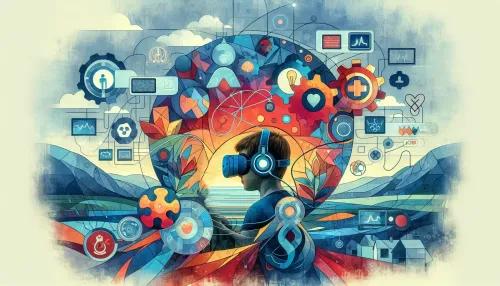Transforming Autism Support: The Revolutionary Impact of Artificial Intelligence

Artificial Intelligence (AI) has rapidly emerged as a groundbreaking force in enhancing various aspects of healthcare, with autism support being no exception. Its transformative potential in revolutionizing autism therapy has sparked widespread excitement and numerous debates within the scientific, medical, and caregiving communities. This article dives deep into the unprecedented role of AI in addressing autism, shedding light on how cutting-edge innovations are reshaping the landscape of support for autistic children and their families.
AI Revolution in Autism Therapy
AI-driven technologies are spearheading a paradigm shift in how autism therapy is approached and executed. Leveraging machine learning algorithms and data analytics, these innovations hold the promise of bridging critical gaps in traditional therapeutic methods. By processing vast amounts of behavioral and developmental data, AI can deliver personalized interventions tailored to each child's unique needs, ultimately fostering more effective outcomes.
One of the most compelling aspects of AI in autism support is its capacity to personalize learning and therapy experiences for autistic children. Through sophisticated adaptive learning models, AI-powered platforms can dynamically adjust teaching methods and intervention strategies based on real-time feedback and individual progress indicators. This personalized approach not only maximizes the efficacy of therapy but also nurtures a more engaging and empowering learning environment for autistic learners.
Personalizing Learning and Therapy with AI
While the potential benefits of AI in autism support are undeniable, ethical considerations loom large. As AI systems become increasingly intertwined with sensitive therapeutic interventions, it becomes paramount to ensure that ethical standards are rigorously upheld. From informed consent protocols to data privacy safeguards, navigating the morality of AI's role in autism support demands a vigilant and proactive approach to mitigate potential risks and uphold the well-being of autistic individuals.
The impact of AI on autism support reverberates across the entire caregiving ecosystem, prompting diverse perspectives from parents, therapists, and caregivers. While some express unwavering optimism about the potential for AI to enrich therapy outcomes, others raise thought-provoking questions about its long-term implications on the human aspect of caregiving. Engaging with these voices offers invaluable insights into the nuanced intertwining of technology and compassion within the realm of autism support.
Related Article: Data-Driven Parenting: Leveraging Technology for Informed Decision-Making in Autism Care
Ethical Considerations in AI for Autism Support
Looking ahead, the trajectory of AI-driven innovations in autism care points towards pioneering therapies that intertwine human expertise with technological prowess. From virtual reality-based interventions to sensory regulation tools powered by AI algorithms, the evolving landscape holds promise for fostering more comprehensive and immersive therapeutic experiences for autistic individuals, transcending conventional boundaries and opening new frontiers for care.
Perspectives from Parents and Therapists on AI
An intriguing facet of AI's integration into autism support pertains to the development of emotional intelligence robots designed to provide companionship and support to autistic children. These advanced robotic entities are engineered to empathetically adapt to individual emotional cues, offering companionship while simultaneously serving as conduits for skill-building activities and social interaction simulations. The profound implications of such robotic companions in enriching autistic children's daily lives are profound, signaling an era where emotional intelligence converges with artificial cognition.
Related Article: Virtual Reality and Autism: Transformative Tools for Enhanced Therapeutic Interventions
Future Innovations: AI-driven Therapies in Autism Care
As technological advancements reshape autism therapy landscapes, preserving privacy and safeguarding sensitive data assume paramount importance. Ensuring that AI-powered platforms adhere to stringent data protection protocols is imperative to engender trust among families and caregivers. By establishing robust encryption mechanisms and comprehensive data access controls, technology-driven autism therapy endeavors can foster a secure environment conducive to optimal care delivery without compromising individual privacy rights.
The infusion of AI tools into educational settings is catalyzing a significant evolution in classroom experiences for autistic learners. With adaptive learning platforms and AI-assisted educational resources becoming increasingly prevalent, teachers can engage students through personalized learning pathways that align with their cognitive strengths and challenges. This educational transformation not only empowers autistic learners with tailored support but also equips educators with invaluable insights into individualized learning trajectories.
The Role of Emotional Intelligence Robots in Support
AI's real-time progress monitoring capabilities hold immense potential in revolutionizing how developmental milestones are tracked in autistic children. By harnessing advanced algorithms that analyze behavioral patterns and response metrics, caregivers can gain nuanced visibility into each child's developmental trajectory. This granular insight enables timely adjustments to therapeutic approaches while facilitating continuous, data-informed assessments that drive more precise interventions aligned with individual progress markers.
Privacy Concerns in Technology-driven Autism Therapy
In conclusion, the integration of AI into autism support represents a pivotal juncture in advancing care methodologies for autistic individuals. By forging synergies between technological innovation, ethical consciousness, and compassionate caregiving, AI holds unrivaled potential to transform the trajectory of autism therapy while honoring the unique needs and experiences of every child on the spectrum.
Frequently Asked Questions
AI personalizes learning and therapy by utilizing adaptive learning models that adjust teaching methods based on real-time feedback. This dynamic approach allows interventions to be tailored to each child's unique progress, maximizing the effectiveness of therapy and creating a more engaging environment for autistic learners.
Ethical considerations in AI for autism support include ensuring informed consent, protecting data privacy, and maintaining high moral standards in therapeutic interventions. As AI becomes more integrated into sensitive care, it is crucial to navigate these issues carefully to safeguard the well-being of autistic individuals.
AI can revolutionize tracking developmental milestones by analyzing behavioral patterns and response metrics in real-time. This advanced monitoring provides caregivers with detailed insights into each child's progress, enabling timely adjustments to therapeutic approaches and fostering more effective, data-driven interventions.
Check Out These Related Articles

Wearable Tech Advancements: Empowering Autistic Children with Innovative Therapeutic Interventions

Embracing Virtual Therapies: Enhancing Autism Care in the Digital Age

Adaptive Technologies in Autism Care: Innovations from Urban Centers
